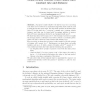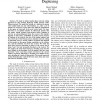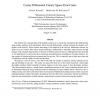160 search results - page 23 / 32 » On the List-Decodability of Random Linear Codes |
CRYPTO
2011
Springer
12 years 7 months ago
2011
Springer
Very few public-key cryptosystems are known that can encrypt and decrypt in time b2+o(1) with conjectured security level 2b against conventional computers and quantum computers. Th...
ECCC
2011
12 years 11 months ago
2011
A q-query locally testable code (LTC) is an error correcting code that can be tested by a randomized algorithm that reads at most q symbols from the given word. An important questi...
GLOBECOM
2010
IEEE
13 years 5 months ago
2010
IEEE
We study an online random linear network coding approach for time division duplexing (TDD) channels under Poisson arrivals. We model the system as a bulk-service queue with variabl...
ICDCS
2009
IEEE
14 years 4 months ago
2009
IEEE
In distributed storage systems, erasure codes represent an attractive solution to add redundancy to stored data while limiting the storage overhead. They are able to provide the s...
TIT
2002
13 years 7 months ago
2002
One method for communicating with multiple antennas is to encode the transmitted data differentially using unitary matrices at the transmitter, and to decode differentially withou...



